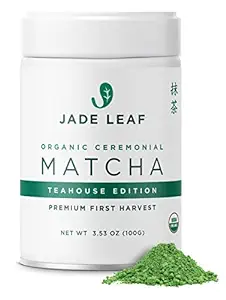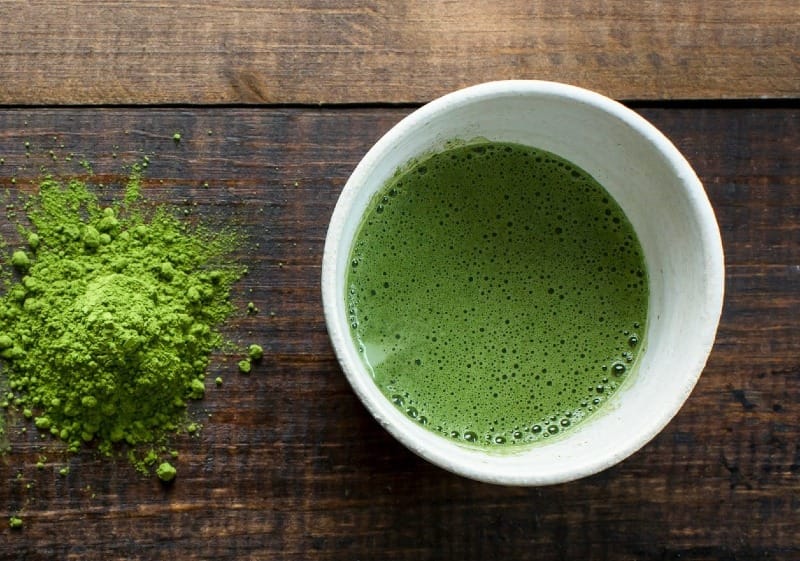Matcha, the vibrant green powdered tea from Japan, has gained immense popularity in recent years. Known for its unique flavor and potential health benefits, many people are curious about its caffeine content. Let's dive into the science behind matcha's caffeine levels and how it compares to other caffeinated beverages.

Key takeaways:
• Matcha contains 19-44 mg of caffeine per gram
• A typical serving of matcha tea has 38-176 mg of caffeine
• Matcha lattes can contain 50-150 mg of caffeine
• Matcha's caffeine is released more slowly than coffee's
• The L-theanine in matcha can promote calm alertness
How much caffeine is in matcha tea?
Matcha tea is unique in that you consume the entire tea leaf, ground into a fine powder. This means you're getting more caffeine than you would from steeped green tea. According to research, matcha contains 19-44 mg of caffeine per gram of powder[1].
A typical serving of matcha tea uses 2-4 grams (about 1/2 to 1 teaspoon) of powder, resulting in approximately 38-176 mg of caffeine per cup. This wide range is due to variations in matcha quality, preparation methods, and serving sizes.
For comparison, an 8-ounce cup of brewed coffee contains about 95 mg of caffeine on average. This means that depending on how it's prepared, a cup of matcha can have similar or even higher caffeine content than coffee.
How much caffeine is in a matcha latte?
Matcha lattes have become increasingly popular in cafes and coffee shops. These drinks typically use 2-3 grams of matcha powder, mixed with steamed milk. Based on this serving size, a matcha latte usually contains between 50-150 mg of caffeine.
It's important to note that the caffeine content can vary depending on the cafe's recipe and the quality of matcha used. Some establishments may use pre-mixed matcha powders that contain less pure tea, potentially reducing the caffeine content.
The unique effects of matcha's caffeine
While the caffeine content in matcha can be similar to coffee, its effects on the body are often described as different. This is due to the presence of L-theanine, an amino acid found in tea leaves.
L-theanine has been shown to promote relaxation without causing drowsiness. When combined with caffeine, it can create a state of calm alertness, often described as a "relaxed focus." This synergistic effect is unique to tea, particularly matcha, due to its high L-theanine content.
Dr. Andrew Weil, a renowned integrative medicine expert, explains: "The combination of caffeine and L-theanine in matcha can provide a sustained energy boost without the jitters often associated with coffee."
Matcha vs. other caffeinated beverages
To put matcha's caffeine content into perspective, let's compare it to other popular caffeinated drinks:
• Brewed coffee (8 oz): 95 mg
• Espresso (1 oz): 64 mg
• Black tea (8 oz): 47 mg
• Green tea (8 oz): 28 mg
• Cola (12 oz): 34 mg
As we can see, matcha's caffeine content (38-176 mg per serving) can be higher than many other teas and even rival coffee. However, it's important to remember that these are average values, and actual caffeine content can vary widely.
Health benefits of matcha beyond caffeine
While caffeine is often the focus when discussing matcha, it's worth noting that this green tea powder offers numerous other health benefits:
- Rich in antioxidants: Matcha is particularly high in catechins, a type of antioxidant that may help protect against cellular damage and chronic diseases[2].
- Potential weight management aid: Some studies suggest that the combination of caffeine and catechins in matcha may boost metabolism and increase fat burning[3].
- Brain health: The L-theanine in matcha has been linked to improved cognitive function and reduced stress[4].
- Heart health: Regular consumption of green tea, including matcha, has been associated with a lower risk of heart disease[5].
Conclusion
Matcha offers a unique caffeine experience, providing a sustained energy boost without the typical coffee crash. Its caffeine content can vary widely, from 38-176 mg per serving, depending on preparation and quality. When combined with L-theanine, matcha's caffeine can promote a state of calm alertness, making it an attractive alternative to coffee for many people.
As with any caffeinated beverage, it's important to consume matcha in moderation. While it offers numerous health benefits, excessive caffeine intake can lead to side effects such as insomnia, anxiety, and digestive issues. If you're sensitive to caffeine or have any health concerns, it's always best to consult with a healthcare professional before making significant changes to your diet 🟩 😄
Ready to explore the world of matcha? Try incorporating this vibrant green tea into your routine and experience its unique effects for yourself. Remember to choose high-quality matcha for the best flavor and health benefits.
References:
- https://www.ncbi.nlm.nih.gov/pmc/articles/PMC7796401/
- https://www.fda.gov/consumers/consumer-updates/spilling-beans-how-much-caffeine-too-much
- https://naokimatcha.com/blogs/articles/why-the-caffeine-content-in-matcha-beats-coffee
- https://www.ncbi.nlm.nih.gov/pmc/articles/PMC6836118/
- https://www.drweil.com/diet-nutrition/nutrition/is-matcha-a-good-alternative-to-coffee/
- https://www.ncbi.nlm.nih.gov/pmc/articles/PMC6413474/
- https://www.ncbi.nlm.nih.gov/pmc/articles/PMC3649093/
- https://www.ncbi.nlm.nih.gov/pmc/articles/PMC6836118/
- https://www.ncbi.nlm.nih.gov/pmc/articles/PMC6412948/
Citations:
- https://www.ncbi.nlm.nih.gov/pmc/articles/PMC8156288/
- https://naokimatcha.com/blogs/articles/why-the-caffeine-content-in-matcha-beats-coffee
- https://www.ncbi.nlm.nih.gov/pmc/articles/PMC7796401/
- https://www.ncbi.nlm.nih.gov/pmc/articles/PMC9792400/
- https://matcha.com/blogs/news/matcha-caffeine
- https://www.timesnownews.com/health/diet/6-health-benefits-of-drinkingmatcha-green-tea-everyday-article-110642812
- https://www.businessinsider.com/guides/health/diet-nutrition/does-matcha-have-caffeine
- https://www.forbes.com/health/supplements/matcha-tea-health-benefits/
- https://www.sanatorium.health/ultraprocessed-foods-and-dementia-new-evidence














Member discussion